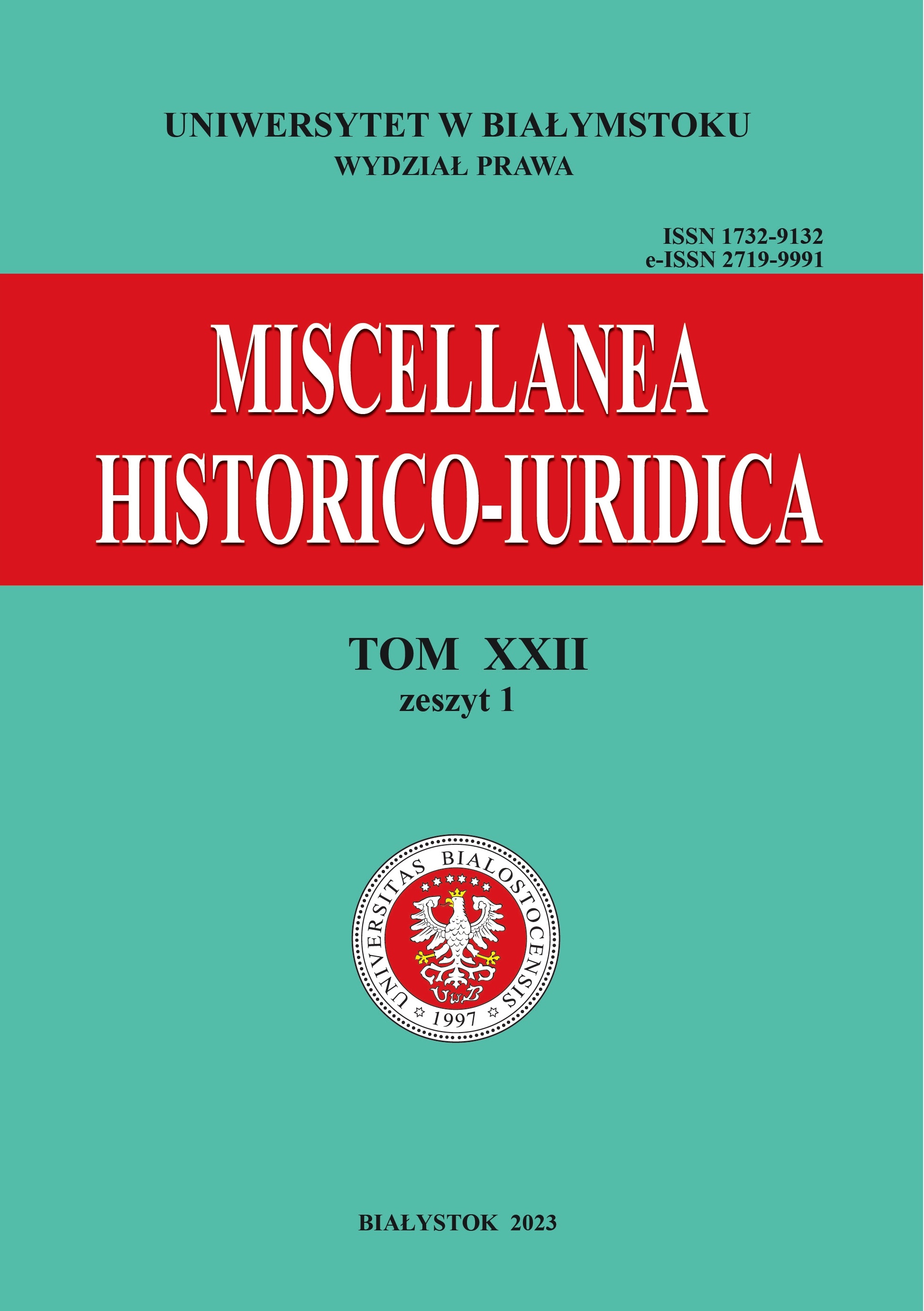The People’s Court as an Organ of the (In)Justice System of the Third Reich
Keywords:
People’s Court, Third Reich, justice systemAbstract
The article describes issues related to the establishment and activity of the People's Court – a German criminal court existing in the years 1934–1945 adjudicating mainly in political cases. This paper presents and discusses the genesis and constitution of the Court, the proceedings before it, the scope of its material and local jurisdiction, and the role it played in practice. At the same time, it should be borne in mind that the position of the People’s Court evolved gradually over time, and not only its composition changed, but also the scope of its jurisdiction, which was constantly being expanded to cover more and more crimes. The work is also partly devoted to the presentation of the judges adjudicating in the Court and their post-war fate. Despite the important role played by the People's Court in the justice system of the Third Reich, the subject of its existence has not been explored in detail in Polish literature. Previous publications primarily referred to foreign literature, generally omitting the analysis of legal acts. For this reason, this work uses not only the historical and legal method, but also the formal and dogmatic method, making extensive references to normative acts of statutory and sub-statutory rank constituting the basis for the activity of the Court.
References
Wyrok Sądu Rzeszy z dnia 23 grudnia 1933 r., sygn. akt XII H 42/33.
Wyrok Trybunału Ludowego z dnia 22 lutego 1943 r., sygn. akt 1 H 47/43.
Wyrok Trybunału Wojskowego USA nr III z dnia 3 grudnia 1947 r., sprawa The United States of America vs. Josef Altstötter, et al.
Form W., Neugebauer W., Schiller T., NS-Justiz und politische Verfolgung in Österreich 1938-1945. Analysen zu den Verfahren vor dem Volksgerichtshof und dem Oberlandesgericht Wien, Monachium 2006.
Graczyk K., Sądy specjalne III Rzeszy jako „sądy doraźne frontu wewnętrznego” (1933-1945), „Miscellanea Historico-Iuridica” 2019, t. XVIII, z. 2.
Graczyk K., Wyrok niemieckiego Trybunału Ludowego z 1943 r. w sprawie kłamstwa katyńskiego, „Z Dziejów Prawa” 2015, t. 8, nr 16.
Grądzka-Rejak M., Namysło A., Prawodawstwo niemieckie wobec Polaków i Żydów na terenie Generalnego Gubernatorstwa oraz ziem wcielonych do III Rzeszy. Analiza porównawcza, [w:] Stan badań nad pomocą Żydom na ziemiach polskich pod okupacją niemiecką. Przegląd piśmiennictwa, red. T. Domański, A. Gontarek, Warszawa-Kielce 2022.
Kulesza W., Crimen laesae iustitiae. Odpowiedzialność karna sędziów i prokuratorów za zbrodnie sądowe według prawa norymberskiego, niemieckiego, austriackiego i polskiego, Łódź 2013.
Kulesza W., Odpowiedzialność karna za zbrodnie sądowe sędziów III Rzeszy w Niemczech Zachodnich i Wschodnich, „Czasopismo Prawno-Historyczne” 2021, t. LXXIII, z. 2.
Kurkowska E., Procedura karna na ziemiach polskich okupowanych przez Niemcy w czasie II wojny światowej, „Studia Iuridica Lublinensia” 2012, t. XVII.
Lankheit K.A., Todesurteile am laufenden Band, https://www.faz.net/aktuell/politik/politische-buecher/roland-freisler-todesurteile-am-laufenden-band-13486709.html.
Marxen K., Terror und Normalität – Der Volksgerichtshof in zeitgeschichtlicher Perspektive, „Humboldt Forum Recht” 2005, nr 9.
Ryszka F., Państwo stanu wyjątkowego. Rzecz o systemie państwa i prawa Trzeciej Rzeszy, Warszawa 2021.
Skorupka J., O sprawiedliwości procesu karnego, Warszawa 2013.
Schädler S., „Justizkrise” und „Justizreform” im Nationalsozialismus. Das Reichsjustizministerium unter Reichsjustizminister Thierack (1942-1945), Tybinga 2009.
Wagner W., Der Volksgerichtshof im nationalsozialistischen Staat. Mit einem Forschungsbericht für die Jahre 1975 bis 2010, Monachium 2011.
Wichert W., Ustawa o pełnomocnictwach (Ermächtigungsgesetz) z 23 marca 1933 roku jako katalizator budowy państwa wodzowskiego w Niemczech, „Studia nad Autorytaryzmem i Totalitaryzmem” 2019, t. 41, nr 4.
Downloads
Published
Issue
Section
License
Copyright (c) 2023 Uniwersytet w Białymstoku (entire issue as a whole); Paweł Bury (article)

This work is licensed under a Creative Commons Attribution-ShareAlike 4.0 International License.







